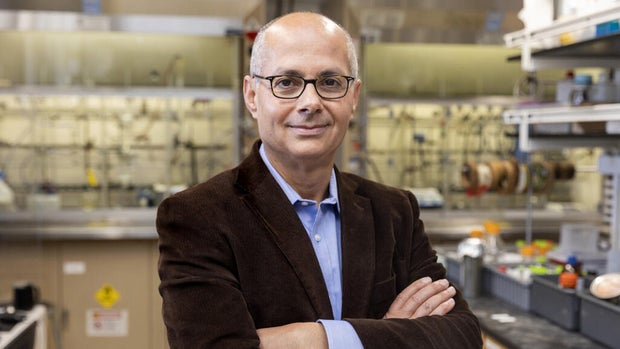UC Berkeley scientist shares 2025 Nobel Prize in Chemistry for molecular discoveries

By Tim Fang
Three scientists, including a professor at the University of California, Berkeley, have won the 2025 Nobel Prize in Chemistry for their discoveries leading to a new form of molecular architecture.
Early Wednesday, The Royal Swedish Academy of Sciences announced chemistry professor Omar Yaghi received the award, along with Susumu Kitagawa of Kyoto University in Japan and Richard Robson of the University of Melbourne in Australia.
The group is being credited for their work on so-called “metal-organic frameworks”, which organize metal ions and molecules to form crystals that contain large cavities. Applications of the frameworks include harvesting water from desert air, capturing carbon dioxide, storing toxic gases and catalyzing chemical reactions.
“Metal–organic frameworks have enormous potential, bringing previously unforeseen opportunities for custom-made materials with new functions,” Heiner Linke, Chair of the Nobel Committee for Chemistry, said in a statement.
Yaghi has created metal-organic frameworks that absorbed water directly from the air and incorporated them into a water harvester that can be used in low-humidity environments such as deserts. The university said his lab spun off a company to market small microwave-sized harvesters that can capture up to five liters of water from the air per day in arid environments.
According to a statement from the university, Yaghi was in an airport, traveling to a conference in Brussels, Belgium, when he learned about the award.
“There is nothing like this, it’s an astonishment,” Yaghi said, adding that receiving the prize “is a feeling you don’t have often.”
Yaghi was Born to Palestinian refugees in Amman, Jordan in 1965. Now an American citizen, Yaghi began his studies in the U.S. in the early 1980s.
“I was in love with chemistry from the very beginning,” Yaghi said. He had received his bachelor’s degree from the State University of New York at Albany in 1985 and earned his doctorate at the University of Illinois at Urbana-Champaign five years later.
Following stops at Arizona State University, the University of Michigan and UCLA, Yaghi joined the chemistry faculty at UC Berkeley in 2012.
According to the university, Yaghi is the 28th UC Berkeley faculty member to win a Nobel Prize and the fifth winner in the past five years. On Tuesday, emeritus professor John Clarke shared the Nobel Prize in Physics for his work on quantum mechanics.
A third Bay Area researcher, Fred Ramsdell at Sonoma Biotherapeutics in San Francisco, was part of a team awarded the Nobel Prize in Medicine on Monday for their discoveries in immunology.




